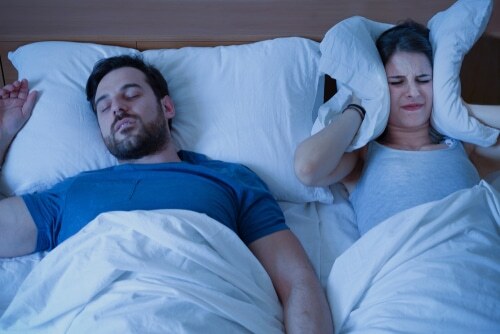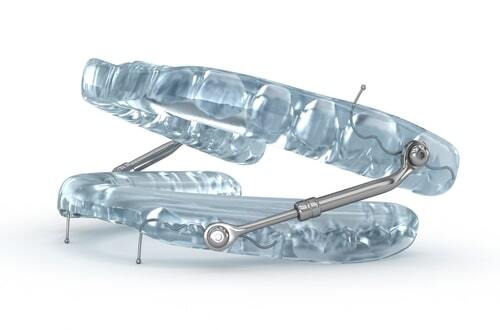Sleep Apnea Treatment in Foley, AL
When you think of sleep apnea treatment, a general dentist might not be the first healthcare provider that comes to mind. However, dentists can play an important role in managing this serious condition, offering effective, non-invasive solutions that many patients aren’t aware of. If you or a loved one struggles with snoring, restless sleep, or daytime fatigue, your dentist may have the key to a better night’s rest.
At Riviera Dental Care, we offer at-home sleep tests to evaluate your sleep quality and special oral appliances to help you breathe easier throughout the night. Don’t let interrupted sleep become the norm—it’s time to start your journey to restful nights and better health.
What Is Sleep Apnea?
The word “apnea” means “without breath” or “not breathing” in Greek. Sleep apnea is a prevalent sleep disorder characterized by multiple pauses in breathing during sleep. There are three different kinds:
- Obstructive sleep apnea (OSA): With OSA, your breathing stops because your throat muscles relax, causing a blockage in your airways. It’s the most common type of sleep apnea, affecting approximately 39 million American adults.
- Central sleep apnea (CSA): CSA is a neurological condition. Unlike OSA, it occurs when the brain doesn’t send the correct signals to the muscles that help you breathe.
- Complex sleep apnea: This form is rarer and is also called treatment-emergent central sleep apnea. It’s a combination of OSA and CSA that can occur when CSA develops in those undergoing treatment for OSA, typically from CPAP or BiPAP use.
Certain people have a higher risk of developing sleep apnea, especially obstructive sleep apnea. Those who are overweight, male, over 40, or have a family history of the condition are more likely to develop OSA. Anatomical traits like a large neck, small jaw, or enlarged tonsils can also contribute. Lifestyle choices such as smoking, alcohol, and sedative use increase risk, as do medical conditions like hypothyroidism, PCOS, type 2 diabetes, heart failure, and hypertension. While men are more likely to develop OSA, women’s risk rises after menopause due to hormonal changes.
While sleep apnea is common, many people go undiagnosed. Recognizing the following signs and symptoms can help you determine if you or a loved one may have obstructive sleep apnea:
 Loud snoring
Loud snoring- Pauses in breathing
- Gasping or choking
- Restless sleep
- Mouth breathing
- Morning headaches
- Sore throat or dry mouth
- Daytime fatigue
- Concentration problems
- Irritability or depression
Why Should Sleep Apnea Be Treated?
If you have sleep apnea or suspect you do, you may wonder why treatment is necessary. Sleep apnea causes you to stop breathing during sleep. If your oxygen levels drop too low, your body’s protective response is to wake you up so that you resume breathing. Unfortunately, these repeated disruptions prevent you from getting restful sleep. The impact of quality sleep can’t be overstated. It is essential for your health and well-being.
Sleep disruption can negatively affect daily functioning and increase your risk of serious health issues. In addition to mood changes, it can also lead to difficulty concentrating, daytime fatigue, and memory problems. Untreated sleep apnea also increases your risk of developing serious conditions like high blood pressure, heart disease, and diabetes, potentially leading to early death.
Therefore, treating OSA is critical to taking control of your overall health.
What Sleep Apnea Treatment Does a Dentist Offer?
When people think of sleep apnea treatment, a CPAP machine is often the first thing that comes to mind. Short for Continuous Positive Airway Pressure, CPAP delivers a steady stream of air through a hose and mask that keeps the airways open. While it’s a common recommendation for severe obstructive sleep apnea (OSA), it’s not the right fit for everyone. Many patients find it bulky, uncomfortable, or unnecessary for their level of treatment. At Riviera Dental Care, we offer a comfortable and effective alternative: oral appliance therapy.
At-Home Sleep Test
The first step to better sleep is a sleep study. Our at-home sleep apnea test offers a simple, convenient way to get started. This diagnostic tool tracks breathing patterns, snoring, oxygen levels, and heart rate while you sleep. The device includes sensors that monitor airflow, blood oxygen, heart rate, and movement. Worn overnight during your normal sleep routine, it records essential data for analysis. While not as detailed as an in-lab sleep study, an at-home test is an easy and effective first step in the sleep apnea treatment process.
Mandibular Advancement Device (MAD)
At Riviera Dental Care, we offer mandibular advancement devices (MADs) to help manage sleep apnea. The mandible refers to the lower jaw, and these custom-fit oral appliances gently position your jaw forward to keep your airways open. Similar to a mouthguard, MADs are made of durable plastic and designed for comfort without feeling bulky. They are ideal for mild to moderate obstructive sleep apnea (OSA) and can also be an option for those with severe OSA who cannot tolerate CPAP therapy.
Compared to other sleep apnea treatments, MADs offer several important benefits:
 Comfortable: Custom-made MADs are tailored to fit your mouth, providing greater comfort than generic devices or CPAP masks.
Comfortable: Custom-made MADs are tailored to fit your mouth, providing greater comfort than generic devices or CPAP masks.- Portable: MADs are small, lightweight, and easy to travel with. Plus, unlike CPAP, they don’t require distilled water, so there’s no need to worry about access while on vacation.
- Non-invasive: MADs provide an effective, non-surgical solution for managing OSA.
- Easy to use: Simple to wear and maintain, they require far less upkeep than CPAP machines.
- Better compliance: Many patients find MADs easier to tolerate than CPAP therapy, leading to higher adherence. After all, the best OSA treatment is the one you’ll actually use.
- Cost-effective: MADs are generally less expensive than CPAP machines and their accessories.
Wake Up Feeling Refreshed Again!
Struggling with restless nights and daytime fatigue doesn’t have to be your reality. Addressing sleep apnea can improve your energy, focus, and overall health. If CPAP therapy isn’t right for you, a comfortable, custom oral appliance may be the solution you need. Take control of your sleep and well-being—schedule a consultation at Riviera Dental Care today!
Frequently Asked Questions
While dental insurance usually doesn’t cover mandibular advancement devices (MADs), medical insurance often does if you meet certain requirements. You’ll need an official diagnosis of obstructive sleep apnea (OSA) from a medical doctor and a prescription for the device. Coverage amounts vary by policy, so it’s important to review the details of your plan and confirm eligibility in advance. If you have out-of-pocket expenses, we also offer flexible financing options through multiple third-party lenders.
Remember that treating sleep apnea isn’t just about better sleep—it’s about protecting your overall health. A mandibular advancement device can help reduce serious risks like heart disease, high blood pressure, and more, making it a valuable investment in your well-being.
If you have sleep apnea, it’s best to sleep on your side. Sleeping on the left side, in particular, can offer some additional benefits, such as improved blood flow and circulation. Elevating your upper body can also help prevent the airways from collapsing. Avoid sleeping on your back, as gravity can worsen airway obstruction.
While medical and dental treatments are important for managing sleep apnea, simple lifestyle changes can also make a big difference:
- Maintain a healthy weight. Eating a balanced diet and staying active can help reduce symptoms, and weight loss can even resolve some mild OSA cases.
- Sleep on your left side. This position helps keep your airway open and improves breathing.
- Stay active. Regular exercise isn’t just good for weight management—it can also improve overall sleep quality.
- Create a sleep-friendly environment. Keep your bedroom cool, dark, and quiet, and stick to a consistent sleep schedule.
- Limit caffeine and nicotine before bed. Both can interfere with restful sleep.
- Avoid sedatives and sleeping pills. These can over-relax the throat muscles, making airway blockages worse.
These small changes in your daily routine can support your treatment plan and lead to better sleep, improved health, and more energized days.
